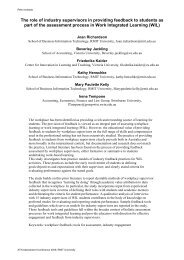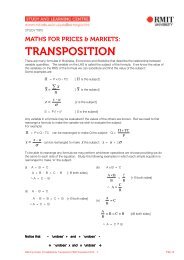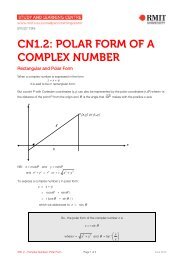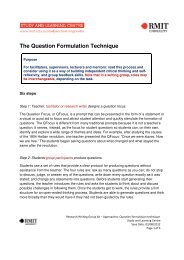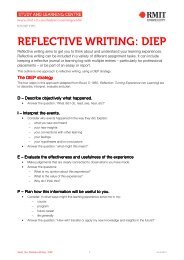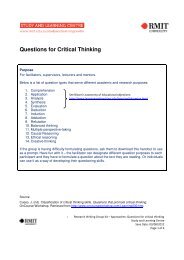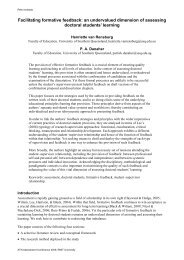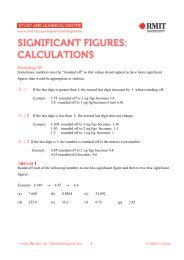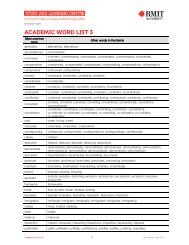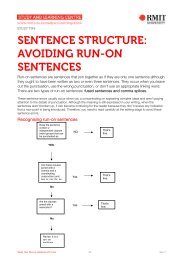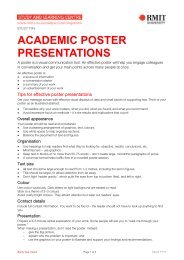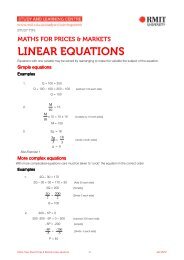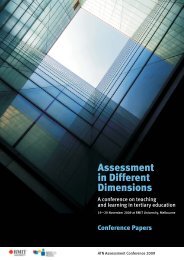student feedback and leadership - Office for Learning and Teaching
student feedback and leadership - Office for Learning and Teaching
student feedback and leadership - Office for Learning and Teaching
Create successful ePaper yourself
Turn your PDF publications into a flip-book with our unique Google optimized e-Paper software.
Student Feedback & Leadership<br />
3.3 Cycle Three: Engaged Leadership<br />
3.3.1 Introduction<br />
The third action research cycle involved the design of approaches to build<br />
<strong>leadership</strong> capacity by transferring lessons being learnt within <strong>and</strong> beyond<br />
those leaders engaged in the project. Table 3 presents a summary of the action<br />
research process, identified as Engaged Leadership, that occurred in this third<br />
cycle. This cycle roughly paralleled the end of the first year of the project <strong>and</strong><br />
thus provided a useful ‘pause point’ to the action research process.<br />
Table 3 Action Research Cycle Three: Engaged Leadership<br />
CYCLE THREE<br />
ENGAGED<br />
Transfer Lessons<br />
LEADERSHIP<br />
Formal – In<strong>for</strong>mal<br />
Networking<br />
PLAN ACT OBSERVE REFLECT<br />
Project website Need to involve Active engagement<br />
pedagogy experts<br />
Facilitate sharing<br />
of ideas<br />
Facilitate reflections<br />
<strong>and</strong> analysis of<br />
<strong>leadership</strong> critical<br />
success factors <strong>and</strong><br />
barriers to building<br />
<strong>leadership</strong> capacity<br />
ARTs<br />
Develop interview<br />
<strong>and</strong> focus group<br />
guiding questions<br />
<strong>and</strong> analyse data<br />
from interviews<br />
Develop evaluation<br />
tools, data collection<br />
<strong>and</strong> analysis<br />
Case study developed<br />
<strong>for</strong> website<br />
Heads of School<br />
presentations to<br />
disseminate<br />
Extra funding support<br />
by DVC(A)<br />
Presentations to Grad.<br />
Cert. Tertiary T&L<br />
Interviews held<br />
with cross section<br />
of senior leaders.<br />
Mid project review<br />
‘Not invented here’<br />
syndrome<br />
Different roles<br />
of Facilitators<br />
Analysis of interviews<br />
revealed no extra<br />
insights from Plenary<br />
decision<br />
Is evaluation singular<br />
or group think<br />
Systematic approach<br />
to networking<br />
Role of learning<br />
<strong>and</strong> teaching expert<br />
(facilitator)<br />
Need to balance<br />
‘pure’ <strong>and</strong> ‘applied’<br />
approach to research<br />
Purpose <strong>and</strong><br />
appropriateness<br />
of interviews?<br />
How to avoid<br />
a ‘blame’ culture<br />
when things<br />
go wrong<br />
3.3.2 Plan<br />
While Cycle Two demonstrated the second <strong>leadership</strong> element of a<br />
collaborative approach to <strong>student</strong> <strong>feedback</strong>, it was recognised that moving<br />
from the existing competitive culture (both between academic disciplines<br />
<strong>and</strong> also between academic <strong>and</strong> Service ‘managerial’ approaches) presents<br />
a significant challenge <strong>for</strong> universities. This led to the next cycle that focussed<br />
on exploring action to engage more leaders by transferring the lessons being<br />
learnt from the project to the broader university community.<br />
Page 48



